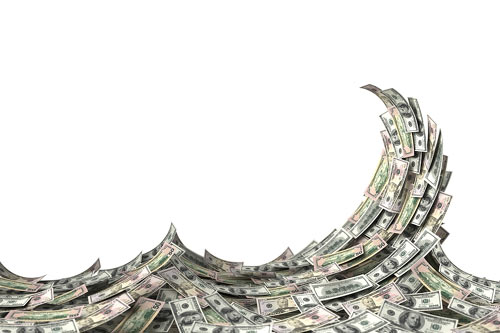
Here is an eye-popping figure: "CNN will make approximately $100 million in television and digital advertising revenues more than it would expect in the typical election year," according to NPR.
Just to reiterate: That's not $100 million total; that's $100 million on top of the money CNN would have raked in anyway.
As NPR's David Folkenflik wrote, "The network has turned a financial corner thanks to the painstaking initiatives of its chief, Jeff Zucker, and to the unpredictable words of another man not employed by CNN: Donald Trump."
Yes, Trump has been good for some in the media business. This has been obvious since the first debate of the Republican presidential primary, which smashed a cable TV viewership record with an audience of 24 million. Before the second debate, Advertising Age reported that CNN was charging 40 times its normal ad rate for the event.
Keep in mind, however, that Trump spent little on TV ads throughout most of the campaign and that ad spending on both sides is down, overall, from where it was four years ago. So although some media giants such as CNN have fared well, many local television stations have not enjoyed the regular, quadrennial windfall of campaign ad money. Last month, the Sinclair Broadcast Group, the nation's largest local TV owner, said third-quarter political advertising revenue probably would fall $12 million to $22 million short of expectations.
Before that second GOP debate, sponsored by CNN, Trump wrote a letter to Zucker asking the network to donate its debate profit to charity. He also suggested to Time magazine that he might demand a $10 million appearance fee and donate the money himself. In the end, Trump showed up for free, and CNN kept its profit.
Meanwhile, the candidate's detractors objected to the media's Trump-driven earnings, suggesting that news outlets' constant coverage of the GOP front-runner was largely a play for ratings, readers - and the revenue tied to those metrics. CBS chief executive Les Moonves reinforced the perception in February, when he said at a conference in San Francisco that the Trump spectacle "may not be good for America, but it's damn good for CBS."
"The money's rolling in, and this is fun," Moonves added.
Not a good look. But here's the thing: There is nothing unusual or inherently unseemly about profiting from major news stories. That's how the news business works.
When there is a big blizzard, ratings spike. When there is a major hurricane, ratings spike. When there is a mass shooting or a terrorist attack, ratings spike. And when there is a once-in-a-generation presidential candidate who doubles as a human sound-bite generator, ratings spike.
In all of these situations, ratings spike because people crave information in critical moments. Most journalists and media executives don't wish for shootings and hurricanes and down-in-the-gutter rhetoric, but they respond when news breaks and hope that people tune in to their coverage.
That's not to say that news outlets can't or don't exploit events in unethical ways. But a report that CNN made an extra $100 million on election coverage is not troubling, on its face.
Previously:
• 10/23/16: Trump TV already exists. It's called Right Side Broadcasting
• 08/15/16: If Donald Trump ever cleans up his act, Hillary Clinton could have a problem
• 06/06/16: Hillary makes her Second Amendment problem public
• 05/20/16: Lib pundits blame Deb Schultz, not Sanders, for Dems' division
• 05/05/16: Here's what we know about the big Donald Trump-Megyn Kelly interview
• 05/05/16: 12 of the most misguided media predictions about Donald Trump
• 04/28/16: Trump thinks it's time to label him the 'presumptive nominee.' Nope.
• 04/25/16: The 'nasty effect,' and why Donald Trump supporters mistrust the media
• 03/07/16: Even Trump's favorite TV hosts, Scarborough and Bill O', can't avoid feuding with him
• 03/04/16: Mitt Romney: Media darling?
• 03/02/16: Donald Trump: The King of the 'No Comment'
• 02/29/16: Why this new media narrative could actually, for once, hurt Donald Trump
• 02/26/16: Why haven't Trump's tax returns, Clinton's speech gotten the Romney treatment?
• 02/08/16: In media coverage of Chelsea Clinton, the kid gloves are still on


 Contact The Editor
Contact The Editor
 Articles By This Author
Articles By This Author